11 winter pet health hazards to avoid
Antifreeze, candles, and other common cold-weather must-haves may be putting your furry friends at risk.
Updated on October 13, 2022
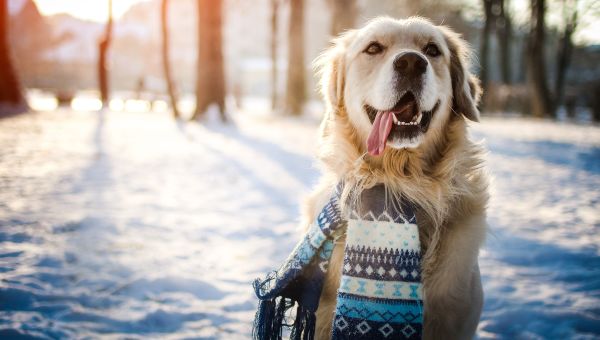
Winter can bring cozy nights by the fireplace and snowy wonderlands outside your window. But along with cooler temperatures come unique dangers to animals. Here are 11 cold weather hazards that can harm your pet, plus ways to keep your furry friends safe.
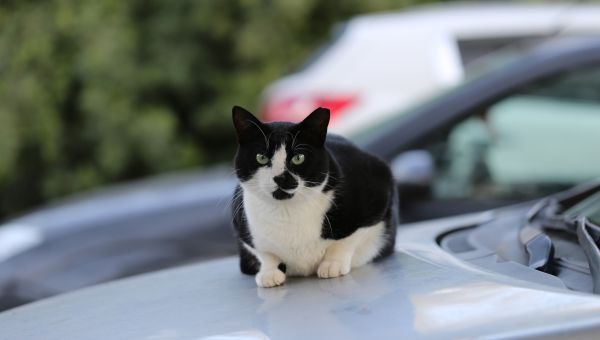
Car hoods and engines
When it’s cold outside, outdoor and feral cats like to curl up in vehicle engines to stay warm. If they get trapped under the hood or car, they could get critically injured when the vehicle starts up.
Before you crank up your car, bang on the hood and honk your horn, so that any animals hiding inside have time to escape. And if you can, keep your own cats inside during the winter, so they stay out of harm’s way.
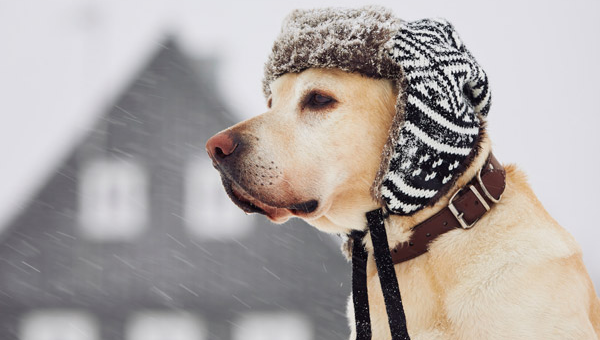
Chilly temperatures
Just like humans, animals can experience hypothermia and frostbite if outside for too long. You can take pets for walks outside, but bring them inside when temperatures start to fall.
Shorthaired pets may need a sweater or jacket. If your dog is weak, shivering, or has trouble breathing, take their temperature. Cats and dogs should have a normal body temperature of 101.5 degrees. If it’s below 98 degrees, head to the vet. If it’s between 98 and 101.5 degrees, try to raise their temperature at home. Wrap them in a blanket, place a hot bottle of water wrapped in a towel near their stomach, and check their temperature every 10 minutes.
Animals burn more energy when it’s cold, too, so giving them some extra calories (more food!) may provide energy and warmth.
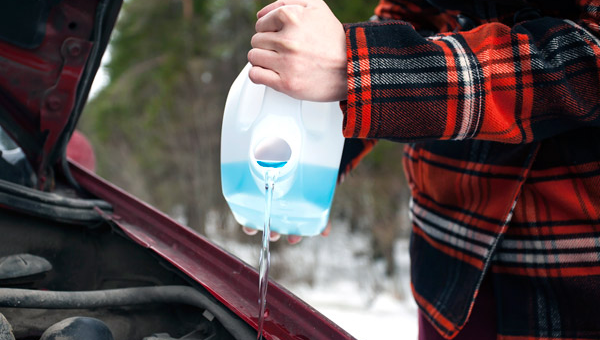
Antifreeze
Your car may need antifreeze during the cooler months, but if ingested, the engine coolant is poisonous to dogs and cats.
The substance smells and tastes yummy to animals, so they may be tempted by any spills or leaks. Be sure to clean dribbles and puddles so your pet doesn’t lick them up, and look for products with propylene glycol rather than ethylene glycol, a chemical that’s still toxic, but safer.
If your pet has been exposed to antifreeze and seems disoriented or has coordination problems, grogginess, or vomiting, see your veterinarian right away. If left untreated, ingestion could lead to a coma or even death.
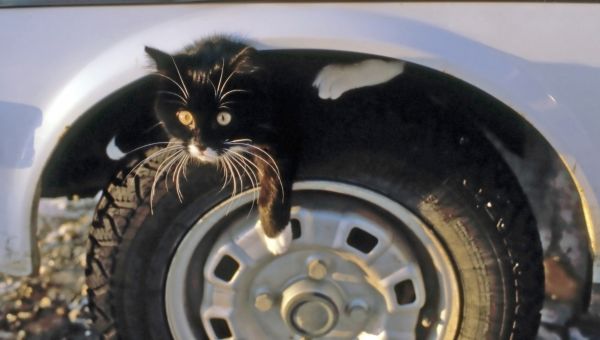
Carbon monoxide
Carbon monoxide, an odorless gas, is poisonous to both humans and animals. Fires, car exhaust, generators, unventilated furnaces, and gas water heaters can emit the gas.
It’s best to keep pets out of the garage, especially if your car has been running. Be sure to keep them away from generators, unventilated furnaces, water heaters, fires, and smoky areas, too.
If you think your pet has been exposed to carbon monoxide, head to your veterinarian so they can administer oxygen and other treatments. Your pet may need medical attention if they have trouble breathing, or seem weak or lethargic. Consider placing carbon monoxide detectors throughout your home to keep your family and pets safe.
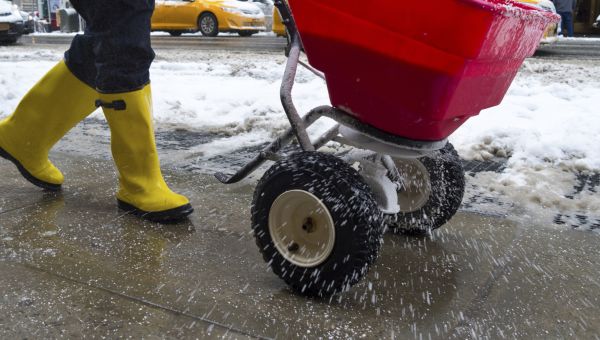
Ice-melting salt
When it comes to clearing a frozen or snowy path, ice salt works wonders. But the main ingredient in most salts—sodium chloride or calcium chloride—can irritate a pet’s paws and may be fatal if ingested.
Socks or booties will protect your pets’ paws from chemically based ice-melting products and can be thrown in the washer after walks. If you don’t have socks or boots for your pet, be sure to clean their paws after a snowy walk outside. You can also use pet-safe salt products like Safe Paw or Morton Safe-T-Pet to treat your own sidewalks and driveways.
If your pet is vomiting, salivating, or has diarrhea or weakness post-walk, they may have ingested some of the salt—see your veterinarian right away.

Candles
Your favorite pine-scented candle may fill your home with an amazing aroma, but it can be a major danger to your pet.
Cats and dogs alike are curious enough that they may swat at candles or try to touch them, burning themselves in the process. Pets may also jump up on tables and knock them over, which can cause a fire. Many animals may have allergic reactions or respiratory problems if they inhale candle chemicals like scents or soot, and some of these ingredients contain carcinogens and neurotoxins that are toxic to them.
Try using safe alternatives such as electric candles and avoid burning any candles with paraffin, lead, benzene, acrolein, toluene, or artificial colors. And of course, never leave candles burning when you’re not home.
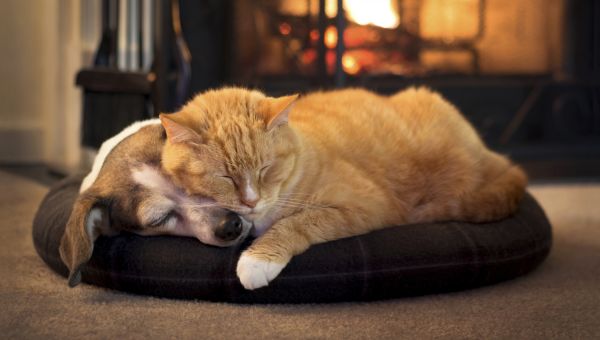
Indoor heaters and fire places
Space heaters cause about 1,700 fires every year, according to the United States Consumer Product Safety Commission. Space heaters run on electricity, propane, natural gas, or kerosene, but the potential risks depend on the type of space heater you have.
When investing in a small space heater, lean towards newer models, which have updated safety features. Select heaters that have the Underwriter's Laboratory label, which means the product has been tested, inspected, and certified. If you have a permanent combustion space heater, make sure a professional inspects the ventilation every year.
Space heaters should be kept on a level surface, up and away from where people and pets walk. If you have a fireplace, be sure to cover it with a sturdy screen your pet can’t topple over.
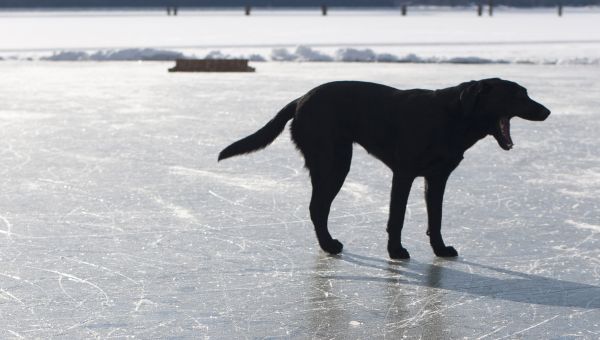
Frozen bodies of water
Taking several walks each day is a good thing—the exercise is beneficial for both you and your pet. But beware of frozen ponds, lakes, and other areas of cold water along your route; they can be major threats to you and your pet.
Try to find iceless paths and trails, and have your pup wear a life jacket or coat if you have to be around water. If your pup does take a dip and you can rescue them safely, wrap them in a warm blanket and place a hot water bottle that’s wrapped in a towel near their stomach. Take them to the veterinarian if their temperature is below 98 degrees.
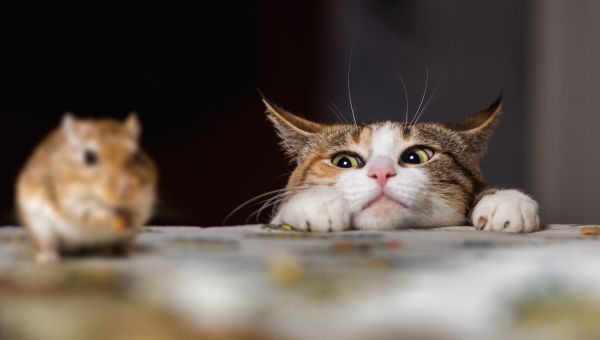
Rodenticides
If you use bait, poison, or traps to get rid of unwanted critters like mice, beware. Like rodents, your pet may be attracted to the bait’s ingredients and tempted to eat or lick it. It depends on the bait’s active ingredient, but some poisons damage nerve cells, while others harm an animal’s cardiovascular system or cause muscle spasms.
If you have to use poison, try ready-to-use tamper-resistant bait stations. And watch your pets when they’re outside—your neighbors may have bait out, too. If your pet does become ill because they’ve inhaled or ingested something harmful, call the Animal Poison Control Center at 888-426-4435 right away.
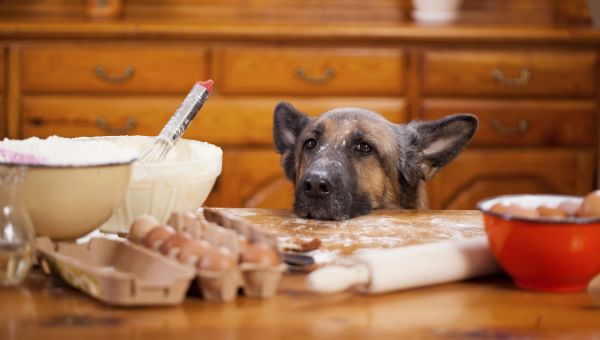
Under-the-table bites
It’s impossible to keep your fur baby away from the delicious holiday food (they always know when the bacon is cooking!), but a bite or two here and there could cause more harm than you think. Always avoid feeding your cats and dogs:
- Chocolate
- Citrus plants
- Coconut
- Grapes
- Raisins
- Dairy products
- Nuts
- Onions
- Raw meats
- Eggs
You should also steer clear of giving Fido raw bones. Your pet can choke or the bone could become lodged in their digestive tract.
Pet-friendly human foods such as cooked chicken or salmon, pumpkin, scrambled eggs, apple slices, or oatmeal make great treats and meal additions. Dogs can have peanut butter or carrots, too.
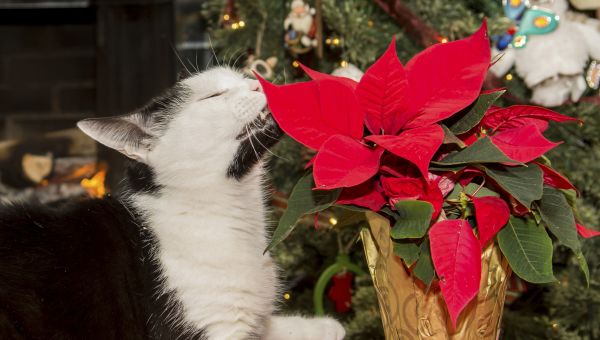
Poisonous holiday plants
Holiday greenery can add some celebratory cheer to your abode, but some popular picks may be harmful to your pet.
The sap in poinsettia leaves may irritate your pet’s mouth and esophagus. Holly and mistletoe berries can cause intestinal upset if eaten, or even seizures or death if large amounts are consumed. Lilies, daffodils, Amaryllis, and Christmas cactuses can lead to tummy issues, too.
When it comes to Christmas trees, it’s likely your pet could send it toppling if they tug on it, and the oil and needles can cause intestinal issues and irritation.
Position plants up high out of your pet’s reach, and if your dog or cat is a chewer, stick with artificial plants to be safe.

American Veterinary Medical Association. Cold weather animal safety. Accessed October 13, 2022.
Pet Health Network. Cats and Cars in Cold Weather. September 11, 2020.
ASPCA. Cold Weather Safety Tips. Accessed October 13, 2022.
Caesar’s Way. Hypothermia: Keeping Your Dog Safe In The Cold. December 15, 2015.
The Humane Society of the United States. Five ways to protect pets in winter. Accessed October 13, 2022.
Pet Poison Helpline. Carbon Monoxide. Accessed October 13, 2022.
PetMD. Carbon Monoxide Poisoning in Dogs. Accessed October 13, 2022.
National Fire Protection Association. Carbon Monoxide Safety. 2017.
PetMeds. Candle Safety and Cats. February 28, 2012.
TexVetPets.org. Near-Drowning in Dogs and Cats Can Be Fatal. September 2014.
National Pesticide Information Center. Rodenticides: Topic Fact Sheet. Accessed October 13, 2022.
Environmental Protection Agency. Choosing a Bait Station Product for Household Use. Updated November 16, 2021.
ASPCA. People Foods to Avoid Feeding Your Pets. Accessed October 13, 2022.
Caesar’s Way. Human Food for Dogs That Will Not Harm. October 23, 2020.
ASPCA. Holiday Safety Tips. Accessed October 13, 2022.
University of New Hampshire. Which Holiday Plants Are Safe for My Cats and Dogs? December 3, 2018.
American Kennel Club Canine Health Foundation. Are Holiday Plants Toxic to Your Pet? December 20, 2010.
Consumer Product Safety Commission. Seasons Change, but Fire and Carbon Monoxide Safety Is Year-Round; Warm Up to CPSC’s Tips for Staying Safe During Colder Weather. December 14, 2021.
More On

article
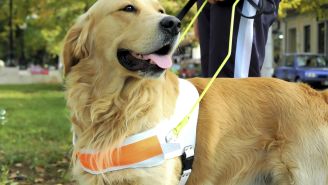
article
